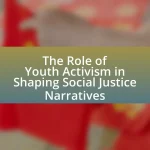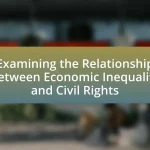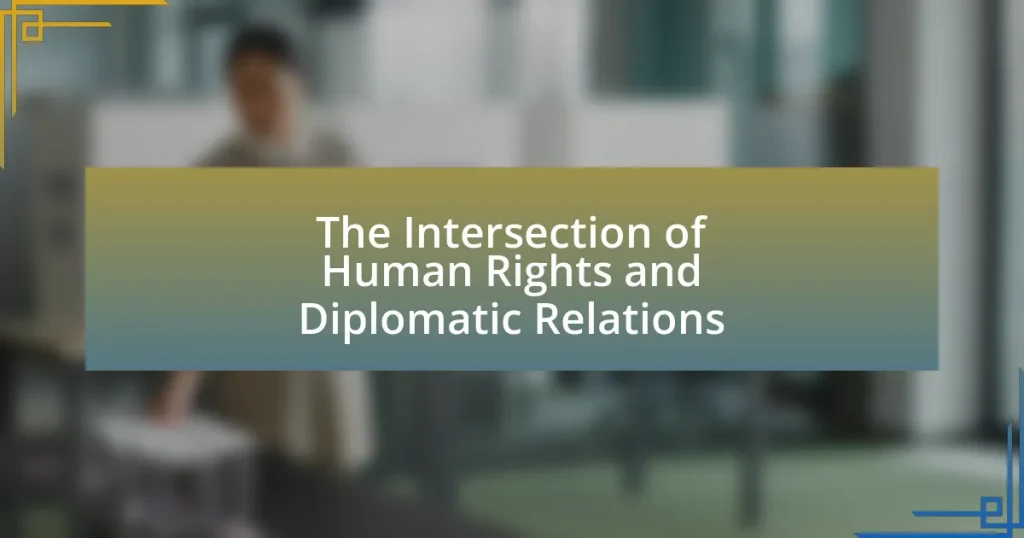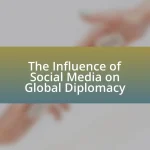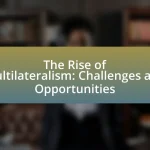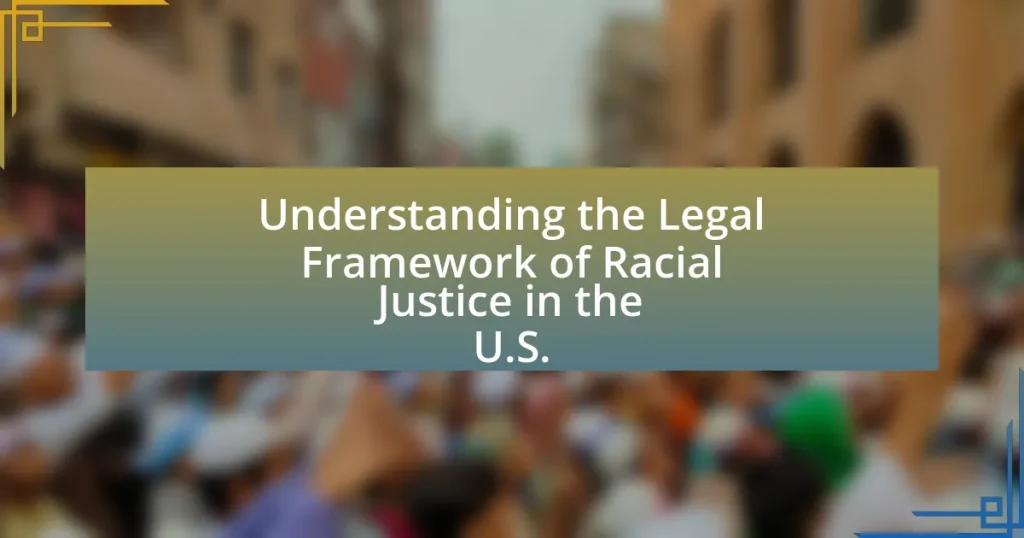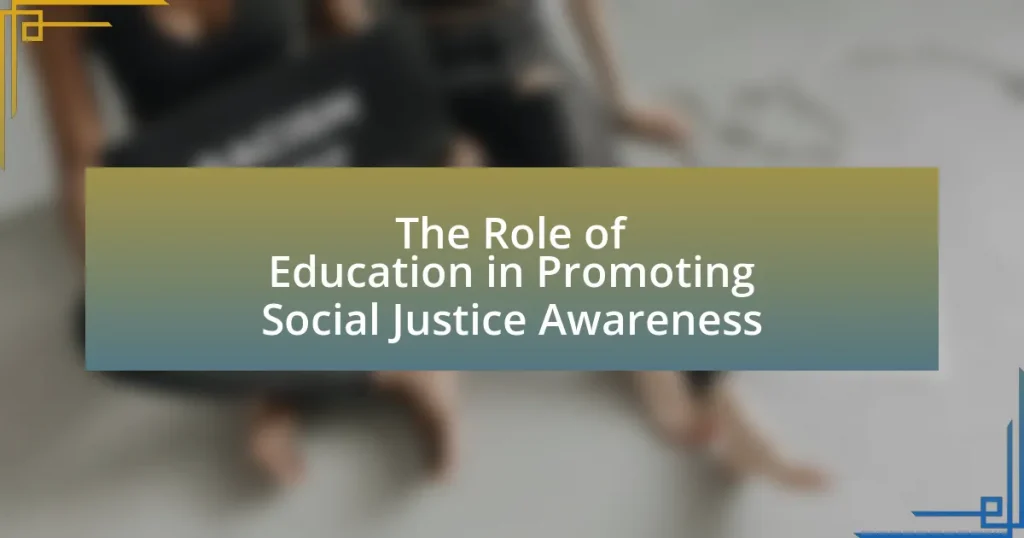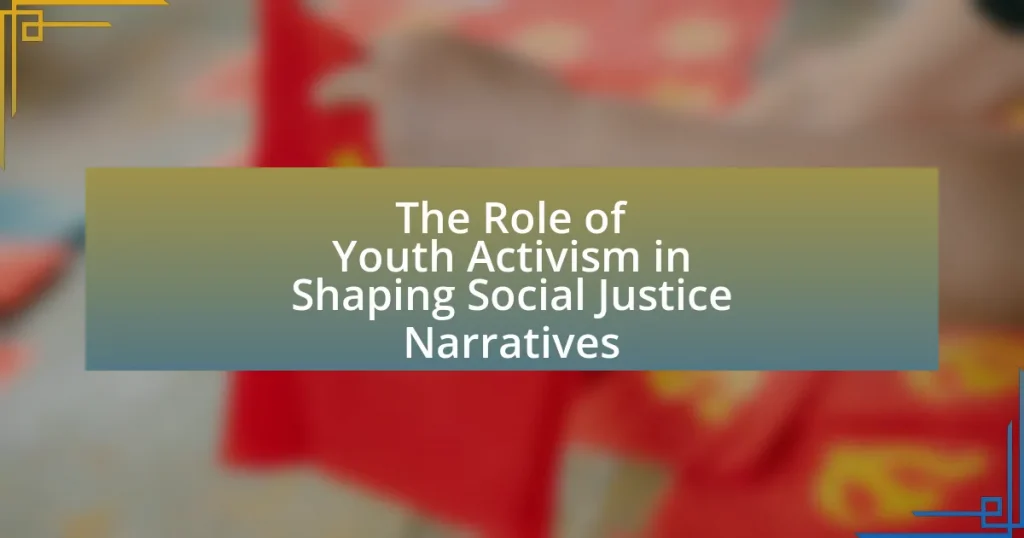The intersection of human rights and diplomatic relations examines how the promotion and protection of human rights influence international diplomacy and state interactions. Key principles such as universality, non-discrimination, accountability, and participation shape diplomatic policies and relationships, often impacting trade agreements and foreign aid. Violations of human rights can strain diplomatic ties, leading to sanctions and isolation, while cultural differences complicate the approach to human rights in diplomacy. The role of international organizations and non-governmental organizations is crucial in establishing norms and advocating for human rights, influencing foreign policy decisions and diplomatic strategies. Emerging trends indicate a growing emphasis on accountability and the integration of human rights into trade agreements, reflecting the evolving landscape of international relations.
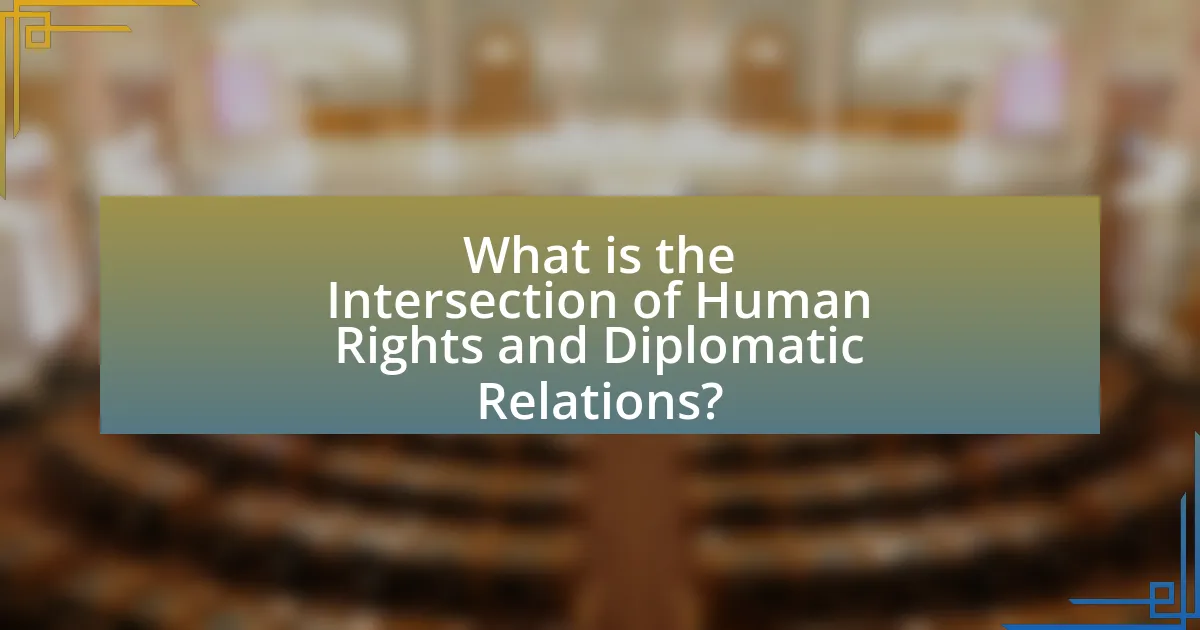
What is the Intersection of Human Rights and Diplomatic Relations?
The intersection of human rights and diplomatic relations refers to the ways in which the promotion and protection of human rights influence international diplomacy and state interactions. Diplomatic relations often involve negotiations and agreements that can either uphold or undermine human rights standards, as seen in various international treaties and conventions, such as the Universal Declaration of Human Rights adopted by the United Nations in 1948. Countries may leverage human rights issues to apply pressure on other nations, impacting trade agreements, foreign aid, and international cooperation. For instance, the U.S. has historically conditioned foreign aid on human rights practices in recipient countries, demonstrating how human rights considerations can shape diplomatic strategies and relationships.
How do human rights influence diplomatic relations between countries?
Human rights significantly influence diplomatic relations between countries by shaping the policies and interactions that nations pursue with one another. Countries that prioritize human rights often use them as a benchmark for establishing alliances, negotiating treaties, and providing foreign aid. For instance, the United States has historically linked its foreign assistance to human rights records, as seen in the Leahy Law, which prohibits military aid to foreign military units implicated in human rights violations. This connection underscores how human rights considerations can lead to sanctions or diplomatic isolation for nations that violate these principles, thereby affecting their international standing and relationships.
What are the key human rights principles that affect diplomacy?
The key human rights principles that affect diplomacy include universality, non-discrimination, accountability, and participation. Universality asserts that human rights apply to all individuals regardless of nationality, which influences diplomatic negotiations and international agreements. Non-discrimination mandates that all individuals should enjoy their rights without distinction, impacting how states engage with each other on issues of equality and justice. Accountability requires states to be held responsible for human rights violations, shaping diplomatic pressure and sanctions. Participation emphasizes the involvement of individuals and communities in decision-making processes, affecting how states approach human rights in their foreign policies. These principles are enshrined in international treaties such as the Universal Declaration of Human Rights and the International Covenant on Civil and Political Rights, which guide diplomatic relations and actions globally.
How do violations of human rights impact diplomatic ties?
Violations of human rights significantly strain diplomatic ties between nations. When a country engages in systematic abuses, such as torture, discrimination, or suppression of free speech, it often faces international condemnation, leading to sanctions or diplomatic isolation. For instance, the United States imposed sanctions on Myanmar following the military’s violent crackdown on Rohingya Muslims, which resulted in a deterioration of relations. Such actions demonstrate that human rights violations can lead to tangible consequences, including reduced trade, limited cooperation on security issues, and a loss of credibility on the global stage.
Why is the intersection of human rights and diplomacy important?
The intersection of human rights and diplomacy is important because it shapes international relations and promotes global stability. When diplomats prioritize human rights, they foster cooperation among nations, reduce conflicts, and enhance the legitimacy of governments. Historical examples, such as the Universal Declaration of Human Rights adopted by the United Nations in 1948, illustrate how integrating human rights into diplomatic efforts can lead to improved international norms and accountability. Furthermore, countries that uphold human rights often experience greater economic development and social cohesion, which contributes to a more peaceful global environment.
What role do international organizations play in this intersection?
International organizations play a crucial role in the intersection of human rights and diplomatic relations by establishing norms, facilitating dialogue, and monitoring compliance. They create frameworks such as treaties and conventions that set standards for human rights, which member states are encouraged to adopt and implement. For instance, the United Nations Human Rights Council conducts reviews of member states’ human rights records, promoting accountability and dialogue. Additionally, organizations like Amnesty International and Human Rights Watch provide reports and advocacy that influence diplomatic discussions, urging states to prioritize human rights in their foreign policies. This interplay between international organizations and diplomatic relations fosters a global environment where human rights are recognized as essential to international peace and security.
How can human rights advocacy shape foreign policy decisions?
Human rights advocacy can significantly shape foreign policy decisions by influencing government priorities and international relations. When advocacy groups highlight human rights abuses, they can compel policymakers to adopt measures such as sanctions, diplomatic pressure, or aid conditionality aimed at promoting human rights. For instance, the U.S. has historically adjusted its foreign aid based on human rights records, as seen in the Leahy Law, which prohibits military assistance to foreign military units implicated in human rights violations. This demonstrates that sustained advocacy can lead to tangible changes in how countries engage with one another, prioritizing human rights in diplomatic discussions and agreements.

What are the challenges at the Intersection of Human Rights and Diplomatic Relations?
The challenges at the intersection of human rights and diplomatic relations include balancing national interests with the promotion of human rights, addressing state sovereignty versus international accountability, and managing the impact of economic and military partnerships on human rights violations. For instance, countries often prioritize strategic alliances over human rights concerns, leading to complicity in abuses. The United Nations reports that in 2021, over 80% of countries faced criticism for human rights violations while maintaining diplomatic ties with nations that overlook these issues. This highlights the complexity of enforcing human rights standards in a diplomatic context, where geopolitical considerations frequently overshadow ethical obligations.
What obstacles do countries face in promoting human rights through diplomacy?
Countries face significant obstacles in promoting human rights through diplomacy, primarily due to conflicting national interests and geopolitical considerations. For instance, nations often prioritize economic or strategic partnerships over human rights advocacy, leading to compromises that undermine human rights efforts. Additionally, authoritarian regimes may resist external pressure, complicating diplomatic engagement. Historical examples include the reluctance of Western countries to confront human rights abuses in China due to trade relations, illustrating how economic dependencies can hinder effective diplomacy. Furthermore, the lack of a unified international stance on human rights issues can dilute the impact of diplomatic efforts, as seen in the varied responses to human rights violations in countries like Syria and Myanmar.
How do political interests conflict with human rights advocacy?
Political interests often conflict with human rights advocacy when governments prioritize strategic alliances or economic benefits over the protection of individual rights. For instance, countries may overlook human rights abuses in nations that are crucial for trade or military partnerships, as seen in the U.S. relationship with Saudi Arabia, where economic ties have led to a muted response to human rights violations. This dynamic illustrates how political motivations can undermine the effectiveness of human rights advocacy, as states may choose to remain silent or even support oppressive regimes to maintain favorable diplomatic relations.
What are the consequences of prioritizing national interests over human rights?
Prioritizing national interests over human rights leads to significant violations of individual freedoms and dignity. When governments focus on strategic advantages, such as economic gain or political alliances, they often overlook or actively suppress human rights, resulting in increased oppression, discrimination, and violence against marginalized groups. Historical examples include the U.S. support for authoritarian regimes during the Cold War, which prioritized geopolitical stability over the promotion of democracy and human rights, leading to widespread human rights abuses in countries like Chile and Argentina. Such actions not only harm the affected populations but can also damage a nation’s international reputation and undermine global human rights norms, creating long-term diplomatic challenges.
How do cultural differences affect the approach to human rights in diplomacy?
Cultural differences significantly influence the approach to human rights in diplomacy by shaping the values, priorities, and interpretations of human rights among nations. For instance, Western countries often emphasize individual rights and freedoms, while many non-Western cultures may prioritize collective rights and social harmony. This divergence can lead to conflicting perspectives on issues such as freedom of expression, gender equality, and minority rights.
A concrete example is the varying responses to the Universal Declaration of Human Rights; while Western nations advocate for its principles, some countries argue that these principles do not align with their cultural or religious values, as seen in debates surrounding women’s rights in certain Middle Eastern nations. This cultural context affects diplomatic negotiations, as countries may resist external pressure to conform to human rights standards that they perceive as culturally imperialistic.
What are the implications of differing human rights standards across cultures?
Differing human rights standards across cultures can lead to significant diplomatic tensions and conflicts. These variations often result in misunderstandings and disagreements between nations, as countries may prioritize different rights based on cultural, historical, and social contexts. For instance, while Western nations may emphasize individual freedoms and political rights, some cultures may prioritize collective rights and social harmony, leading to clashes in international forums such as the United Nations. A notable example is the debate surrounding women’s rights, where Western perspectives advocate for gender equality, while some cultures may interpret these rights through a lens of traditional values, resulting in divergent policies and practices. This divergence can complicate international relations, as countries may impose sanctions or diplomatic pressure based on perceived human rights violations, ultimately affecting trade, security cooperation, and global stability.
How can diplomats navigate cultural sensitivities while advocating for human rights?
Diplomats can navigate cultural sensitivities while advocating for human rights by employing culturally informed dialogue and building relationships based on mutual respect. This approach involves understanding the local cultural context, which allows diplomats to frame human rights discussions in a way that resonates with local values and beliefs. For instance, the Universal Declaration of Human Rights emphasizes dignity, which can be aligned with many cultural traditions that prioritize community and familial ties. By engaging local leaders and communities in conversations about human rights, diplomats can foster a collaborative environment that encourages the acceptance of human rights principles without alienating local customs. This method has been supported by various case studies, such as the successful human rights initiatives in South Africa during the post-apartheid era, where local cultural narratives were integrated into the human rights discourse, leading to broader acceptance and implementation of these rights.
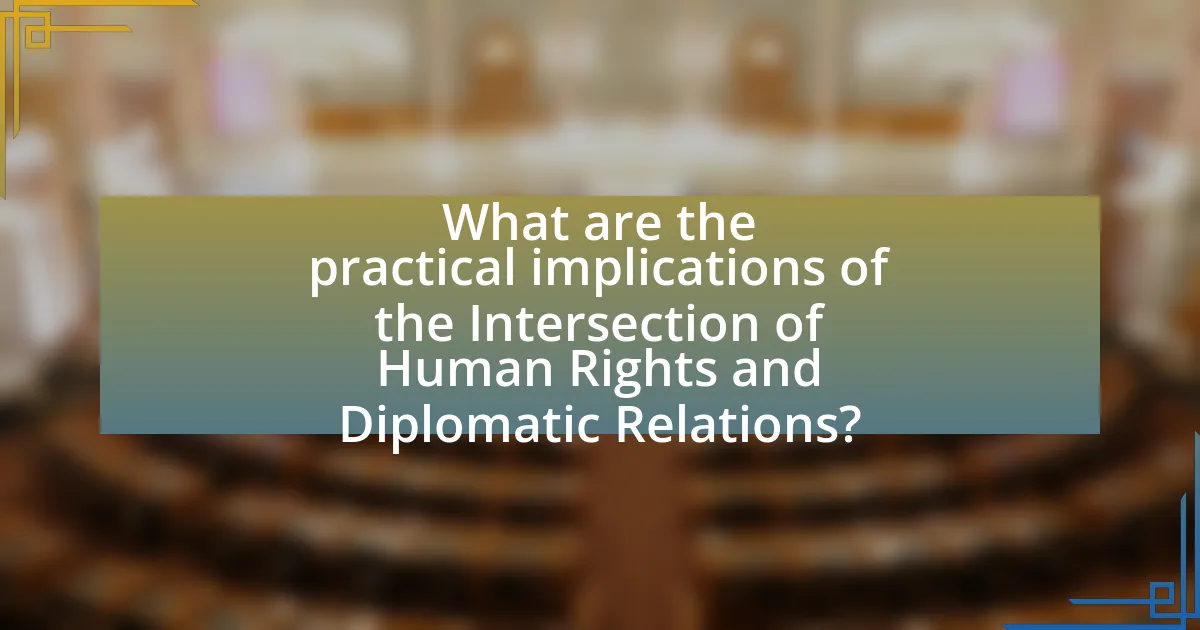
What are the practical implications of the Intersection of Human Rights and Diplomatic Relations?
The practical implications of the intersection of human rights and diplomatic relations include the shaping of foreign policy, influencing international agreements, and affecting bilateral relations. Countries that prioritize human rights in their diplomatic engagements often leverage these values to promote democratic governance and social justice, which can lead to sanctions or diplomatic isolation for those that violate human rights. For instance, the United States has historically imposed sanctions on nations like Iran and North Korea due to their human rights abuses, demonstrating how human rights considerations can directly impact diplomatic strategies and international relations. Additionally, multilateral organizations, such as the United Nations, often incorporate human rights assessments into their diplomatic efforts, which can affect peacekeeping missions and humanitarian aid distribution.
How can countries effectively integrate human rights into their diplomatic strategies?
Countries can effectively integrate human rights into their diplomatic strategies by prioritizing human rights in bilateral and multilateral negotiations. This approach involves establishing clear human rights benchmarks and incorporating them into trade agreements, foreign aid conditions, and diplomatic dialogues. For instance, the European Union has made adherence to human rights a prerequisite for membership and trade agreements, demonstrating that economic incentives can promote human rights compliance. Additionally, countries can leverage international human rights treaties, such as the Universal Declaration of Human Rights, to hold other nations accountable, thereby reinforcing their commitment to human rights on the global stage.
What best practices can be adopted for promoting human rights in diplomacy?
Best practices for promoting human rights in diplomacy include integrating human rights assessments into foreign policy decisions, engaging in multilateral dialogues, and supporting local civil society organizations. Integrating human rights assessments ensures that diplomatic actions align with international human rights standards, as seen in the U.S. State Department’s annual human rights reports, which inform policy decisions. Engaging in multilateral dialogues, such as those facilitated by the United Nations, fosters collaboration among nations to address human rights issues collectively. Supporting local civil society organizations empowers grassroots movements and enhances the effectiveness of diplomatic efforts, as evidenced by the success of initiatives like the European Instrument for Democracy and Human Rights, which funds local advocacy groups.
How can diplomatic training programs incorporate human rights education?
Diplomatic training programs can incorporate human rights education by integrating specific modules that focus on international human rights laws, frameworks, and case studies. These programs can include practical simulations and role-playing exercises that allow diplomats to engage with real-world scenarios involving human rights issues, thereby enhancing their understanding and response strategies. For instance, the United Nations’ Universal Declaration of Human Rights serves as a foundational document that can be used to teach diplomats about the global standards for human rights. Additionally, incorporating guest lectures from human rights experts and organizations can provide firsthand insights into current challenges and best practices in the field. This approach not only equips diplomats with the necessary knowledge but also fosters a culture of accountability and respect for human rights within diplomatic practices.
What role do non-governmental organizations play in this intersection?
Non-governmental organizations (NGOs) play a critical role in the intersection of human rights and diplomatic relations by advocating for human rights standards and holding governments accountable. NGOs often serve as watchdogs, monitoring human rights abuses and providing evidence to inform diplomatic discussions, thereby influencing policy decisions. For instance, organizations like Amnesty International and Human Rights Watch compile reports that highlight violations, which can prompt diplomatic actions such as sanctions or negotiations aimed at improving human rights conditions. Their ability to mobilize public opinion and engage in grassroots activism further amplifies their impact on international relations, making them essential players in promoting human rights globally.
How can NGOs influence diplomatic relations regarding human rights?
NGOs can influence diplomatic relations regarding human rights by advocating for policy changes, raising awareness, and providing critical information to governments and international bodies. Through reports and campaigns, NGOs highlight human rights abuses, which can pressure governments to address these issues in their foreign policy. For example, organizations like Amnesty International and Human Rights Watch have documented violations and mobilized public opinion, leading to sanctions or diplomatic actions against offending states. Their ability to gather and disseminate information effectively shapes the narrative around human rights, compelling diplomatic entities to prioritize these concerns in their negotiations and relations.
What partnerships can be formed between governments and NGOs to enhance human rights advocacy?
Governments and NGOs can form partnerships through collaborative initiatives, joint advocacy campaigns, and policy development to enhance human rights advocacy. Collaborative initiatives can include training programs where NGOs educate government officials on human rights issues, fostering a mutual understanding of challenges and best practices. Joint advocacy campaigns can mobilize resources and public support, as seen in the collaboration between the United Nations and various NGOs during the Universal Periodic Review process, which amplifies the voices of marginalized communities. Additionally, governments can involve NGOs in the drafting and implementation of human rights policies, ensuring that diverse perspectives are considered, as demonstrated by the involvement of NGOs in the development of the Sustainable Development Goals, which include human rights considerations. These partnerships leverage the strengths of both entities, enhancing the effectiveness of human rights advocacy efforts.
What are the future trends in the Intersection of Human Rights and Diplomatic Relations?
Future trends in the intersection of human rights and diplomatic relations include an increasing emphasis on accountability for human rights violations, the integration of human rights considerations into trade agreements, and the rise of non-state actors influencing diplomatic agendas. Accountability is becoming a priority as international bodies, such as the United Nations, push for mechanisms to hold states accountable for abuses, evidenced by the establishment of the International Criminal Court. Additionally, trade agreements are increasingly incorporating human rights clauses, reflecting a shift towards linking economic partnerships with ethical standards, as seen in recent agreements by the European Union. Furthermore, non-state actors, including NGOs and social movements, are gaining prominence in shaping diplomatic discourse, as demonstrated by the influence of climate justice movements on international negotiations. These trends indicate a future where human rights are more deeply embedded in diplomatic practices and policies.
How might global movements impact diplomatic approaches to human rights?
Global movements significantly influence diplomatic approaches to human rights by increasing pressure on governments to adopt and uphold human rights standards. For instance, the global #MeToo movement has prompted countries to reassess their policies on sexual harassment and gender equality, leading to diplomatic discussions that prioritize these issues. Additionally, movements like Black Lives Matter have spurred international dialogues on racial justice, compelling nations to address systemic racism within their borders and in their foreign policies. These movements create a global consensus that can shape treaties and agreements, as seen in the United Nations’ Sustainable Development Goals, which emphasize human rights as a fundamental aspect of international relations.
What emerging technologies could influence human rights advocacy in diplomacy?
Emerging technologies such as artificial intelligence, blockchain, and big data analytics could significantly influence human rights advocacy in diplomacy. Artificial intelligence can enhance data collection and analysis, enabling diplomats to identify human rights abuses more effectively and respond promptly. Blockchain technology offers secure and transparent documentation of human rights violations, ensuring accountability and traceability. Big data analytics allows for the aggregation of vast amounts of information from various sources, providing insights into patterns of abuse and facilitating targeted diplomatic interventions. These technologies have already been utilized in various contexts, such as AI-driven monitoring systems that track human rights conditions in real-time, demonstrating their potential impact on diplomatic efforts to promote and protect human rights.


